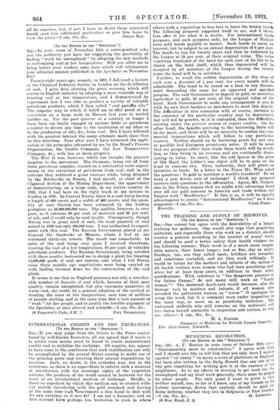INTERNATIONAL CREDITS AND THE EXCHANGES. [To THE EDITOR OF THE
" SPECTATOR."]
Sin,—If one may judge from the letters to the Press contri- buted by well-known financiers, all are agreed that if trade is to revive some means must be found to create international credits and to stabilize the exchange. All experts, too, appear to have come to the conclusion that such stabilization can only be accomplished by the several States ceasing to make use of the printing press and covering their annual expenditure by taxation. Such, no doubt, is the orthodox way, but in the meantime, as there is no super-State to enforce such a measure of interference with the sovereign rights of the respective nations, the products of the world cannot be bartered for the want of an international medium of exchange. Briefly, is there no expedient by which this medium can be created with- out unduly interfering with the gold standard and leaving at the same time erch loeernment a free hand to deal with its own currency as it sees fit? I am not a financier, and on this account have perhaps less hesitation to rush in where others with a reputation to lose fear to leave the beaten track The following proposal suggested itself to me, and I there- fore offer it for what it is worth. For international trade purposes, and such purposes only, let the League of Nations issue gold bonds payable to bearer. Such bonds to carry no interest, but be subject to an annual depreciation of 6 per cent. The bonds to run for twenty years and then be redeemed by the League at 25 per cent. of their original value. The value (omitting fractions) of the bond for each year of its life to be shown on the bond itself, which thus depreciated will be accepted by all members of the League during the twenty years the bond will be in existence.
Further, to avoid the sudden depreciation at the close of each year a discount of per cent. for every month will be admissible. The bond to be issued as a loan to any Govern- ment demanding the same for an approved and specified purpose. The said Government to deposit in gold, or securities equivalent to gold, 25 per cent. of the original value of the bond. Each Government*to make any arrangement it sees fit with its own local bankers or merchants to meet this deposit. The difficulties in this connexion will, of course, increase as the currency of the particular country may be depreciated, but will not be greater, so it is contended, than the difficulties existing under the present system of export credits. On the other hand, the benefits accruing to the borrowing State will be far more, and there will be no necessity to confine the com- mercial transactions which will follow to any particular country Neither should we be bartering goods for our own or possibly bad European promissory notes. It will be noted that for purposes other than trade these bonds will be worth- less, as they bring in no revenue and are continually depre- ciating in value. In short, like the odd Queen in the game of Old Maid, the holder's one object will be to pass on the bond to someone else. Thus, indirectly, they will prove an incentive to trade. In a letter to the Times Mr. Wise asked the questions : Is gold to continue a world's standard? Do we want a new fictive rate of exchange? I think my proposal answers both questions in the affirmative. Again, Mr. Grogan, also in the Times, argues that we might with advantage hand over all our gold reserves to America and trade within our Empire with " Bradburies." If this is so, it will be equally advantageous to create " International Bradburies," as I have






































 Previous page
Previous page